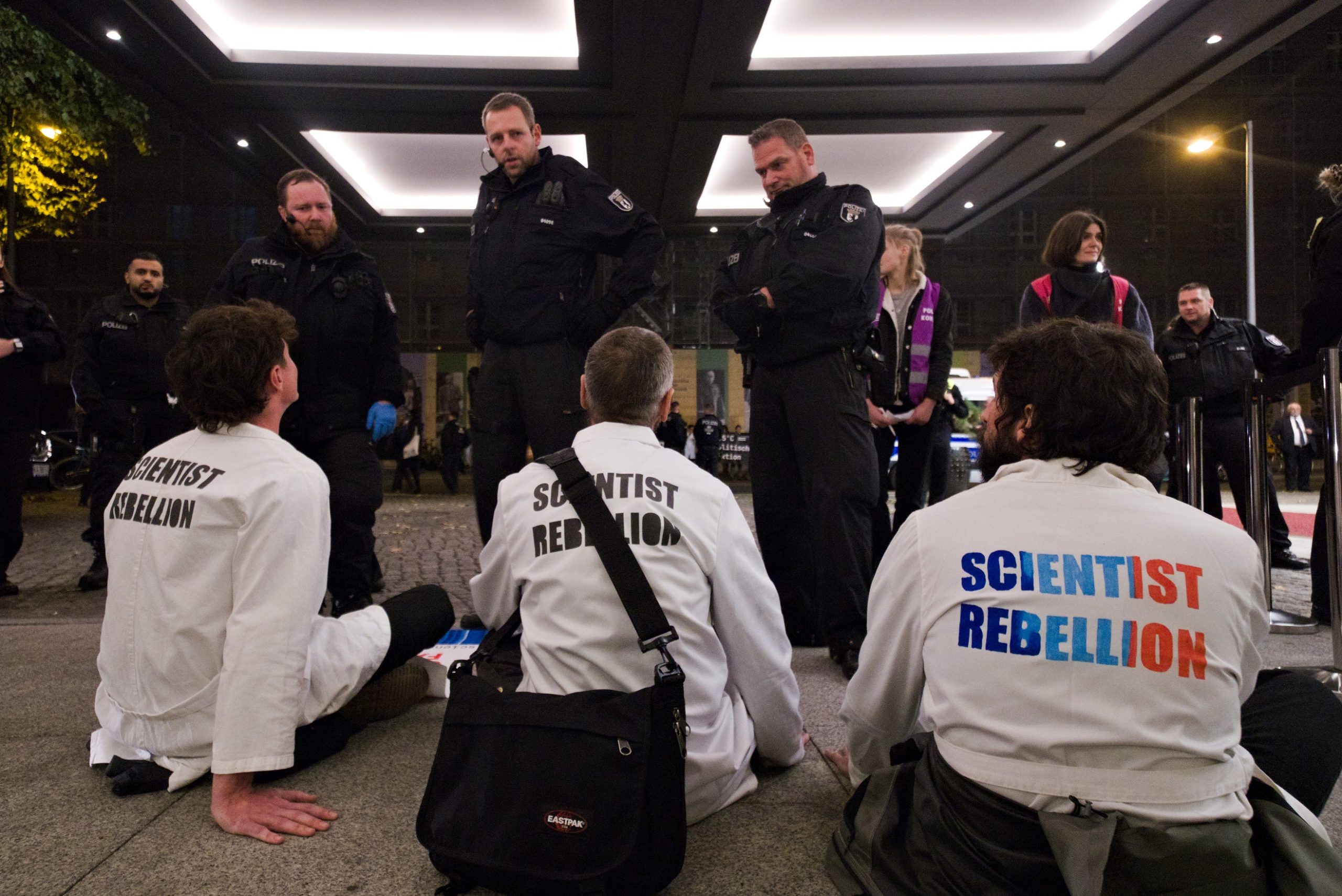Sticking to a maximum of 1.5 degrees of global warming is no longer justifiable, Scientist Rebellion believes. TU Delft scientists signed their petition. Will actions follow?
Campaigning scientists glued to the ground during the World Health Summit in Berlin in October 2022. (Photo: Scientist Rebellion)
On 27 October 2022, Scientific Rebellion affixed huge posters to the window of the Ministry of Economic Affairs and Climate Policy. It was a protest against drilling for gas in the Wadden Sea. Now the activist scientists are issuing a petition and an open letter, in which they support the conclusion of the IPCC report published on 28 February 2022. The world is no longer heading towards a global warming of 1.5 degrees within 10 years, it says; it will most likely be 2 degrees. Over one thousand scientists from around the world signed this petition.
Ten of the signatories work at TU Delft. Delta spoke to three of them, all working at the Geoscience and Remote Sensing Department. Why did they sign this petition? And do they intend to support more actions?
Wrong urgency
“Much of the climate policy is still based on 1.5 degrees of global warming,” said ‘cloud professor’ Herman Russchenberg, department head of Geoscience and Remote Sensing. “Since we are already at 1.1 degrees, this is no longer a realistic expectation. The government should be open and honest about this conclusion. Currently, they are communicating with the wrong urgency. They are urging people to work for an unachievable objective, while we have to remain under 2 degrees.”
‘The petition itself will likely end up in a drawer somewhere’
Another point of criticism according to Russchenberg is that many policy papers assume there will be technology in 30 years’ time that can remove CO2 from the air. “I am in favour of that idea, but it is extremely risky to assume that the technology will be aftually available in time. It is an assumption. You have to tell people that.”
Finally, said Russchenberg, the rich countries can do more for the developing countries. “The developing countries were promised a hundred billion dollars to compensate for environmental damage.” That sum has not yet been paid out, and rich countries should do even more, he feels. “We must also invest money to get those countries fossil-free and at our level of prosperity. We have, you can say, already used up their CO2-budget.”
But Russchenberg does not harbour any illusions about the effect of the Scientist Rebellion’s petition. “The petition itself will likely end up in a drawer somewhere. But I hope that discussions about the petition will stimulate debate evenings, opinion pieces and articles about climate in the media. The TU Delft Communication department can contribute further to this by, for example, organizing more of these kinds of events.”
Tomato soup
Raquel Serrano Calvo, postdoc in Russchenberg’s department, was given the petition by him. She is already seeing lots of workshops, conferences and scientific papers about climate change being advertised. “But currently politicians and other people are not listening to what the scientists are saying. And some activities are more entertaining than serious. I think that we need to make people much more aware.”
The petition shows that the entire scientific world from geography to biology is involved in climate change, says Serrano Calvo. And no, actions like smearing paintings with tomato soup are not supporting that, in her opinion. “That does not directly combat climate change. I only want to be involved in protests that do not cause damage.”
‘I am not going to chain myself to the fence’
Colleague Riccardo Riva also signed the petition. He is associate professor in Geosciences and conducts climate research. Earlier this year he worked on an item for the TV news programme Nieuwsuur about an acceleration in the sea level rise. He also went on the climate march in Rotterdam.
Signing the petition was a logical next step for Riva. “When I shared my contribution to Nieuwsuur on Twitter, the only people who responded were against climate measures. I thought then: it is important as a scientist to respond to policy and to speak out. Continuing to insist on the 1.5 degrees of global warming no longer makes sense in his opinion. “We have missed that goal, we now need to focus on a maximum of 2 degrees.”
Riva is not sure whether he will participate in more actions. “I am not going to chain myself to the fence of a company, for example, but an additional climate march or an action by a group of TU Delft scientists would be interesting. I do not intend to seek the spotlight myself.”
Do you have a question or comment about this article?
K.S.vanderWal@tudelft.nl


Comments are closed.